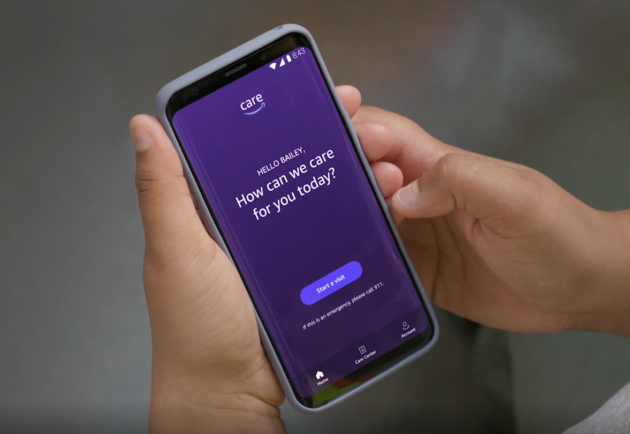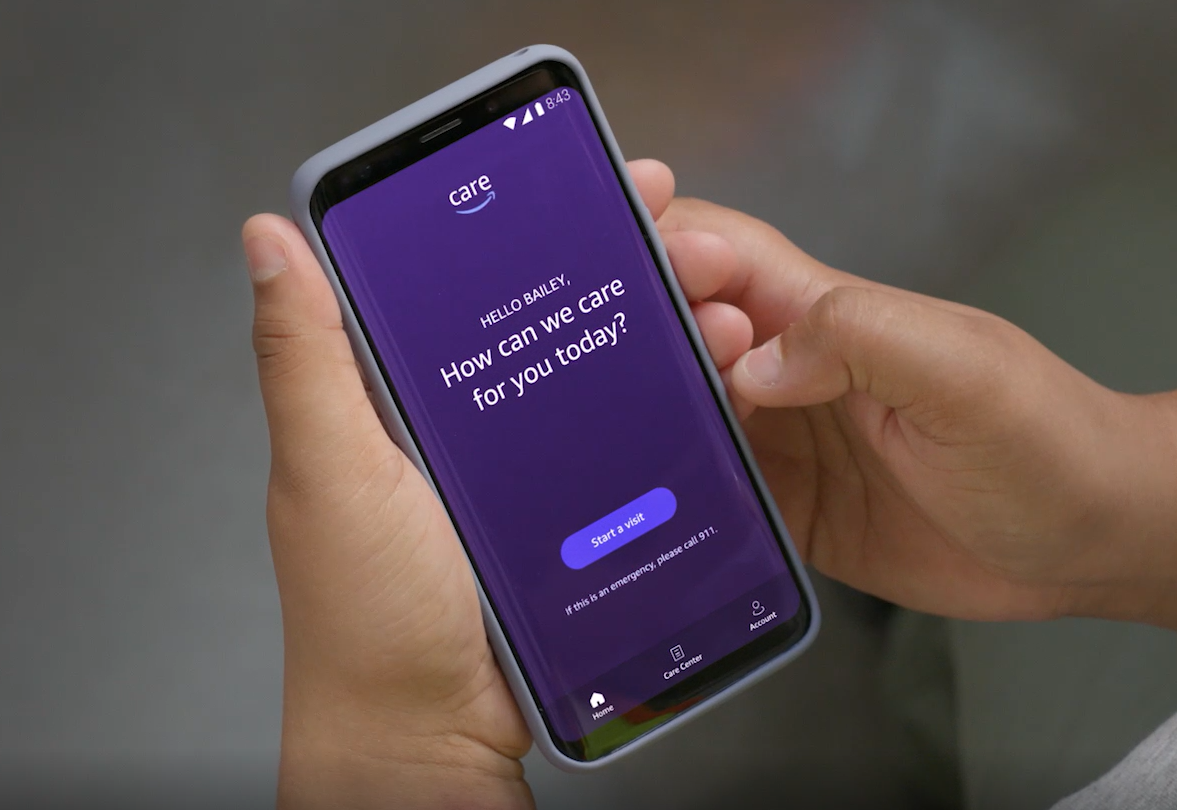[ad_1]

Amazon will stop offering its Amazon Care primary health-care services at the end of this year, according to an internal memo, after determining that it wasn’t “the right long-term solution for our enterprise customers.”
The surprise move Wednesday is a major course correction in Amazon’s broader foray into healthcare. Amazon says the decision impacts only Amazon Care, and not its other health-care initiatives.
“This decision wasn’t made lightly and only became clear after many months of careful consideration,” said Neil Lindsay, Amazon Health Services senior vice president, in the email to Amazon Health Services employees. “Although our enrolled members have loved many aspects of Amazon Care, it is not a complete enough offering for the large enterprise customers we have been targeting, and wasn’t going to work long-term.”
Amazon says company leaders determined that the Amazon Care business model wasn’t working prior to, and independent from, its agreement to acquire primary care company One Medical for $3.9 billion, which was announced July 21. That acquisition is still expected to move ahead, pending regulatory approval.

The company did not disclose the number of employees who will be impacted by its decision to shut down Amazon Care.
“Many Care employees will have an opportunity to join other parts of the Health Services organization or other teams at Amazon – which we’ll be discussing with many of you shortly – and we’ll also support employees looking for roles outside of the company,” Lindsay wrote in the memo to employees.
Amazon Care launched in 2019 as a pilot program for employees in the Seattle area, where Amazon is headquartered. Last year it expanded to non-Amazon employees across the nation.
It is a hybrid of virtual, in-home primary care and urgent care services, without brick-and-mortar clinics or physical locations.
Chrissy Farr, a health tech investor at OMERS Ventures, said there may have been potential overlap with One Medical “that may have been awkward to navigate.” One Medical also sells into employers and offers telemedicine services.
“It could be a signal of where Amazon plans to focus its energies,” Farr said, noting that she did not have first-hand knowledge of the reasons for the decision.
Amazon became a leader in giant industries such as online shopping and cloud computing, but successfully transforming the “huge, troubled, tangled health care sector” won’t be easy, noted a recent Harvard Business Review analysis that detailed significant challenges facing the company’s foray into primary care.
Given the size, complexity and potential for technology to further transform the healthcare market, the sector has emerged as one of the most likely industries where Amazon could find a fourth pillar of its business, alongside its existing three: Amazon Web Services, Amazon Prime, and Amazon Marketplace.
The company launched its Amazon Pharmacy service in November 2020, following its $753 million acquisition of prescription-by-mail company PillPack in 2018.
Amazon is known for sticking to a long-term vision while experimenting with different approaches to achieve its goals. In fact, Amazon Care not the first high-profile healthcare initiative from Amazon to close down. The company last year ended its Haven joint venture with Berkshire Hathaway and JP Morgan Chase.
Up to this point, Amazon Care appeared to be moving steadily forward.
- In February, Amazon said in-person Amazon Care services were expanding to 20 new cities in 2022. Companies such as Hilton, TrueBlue, Silicon Labs, and others use Amazon Care as a benefit for employees.
- Amazon was preparing to add behavioral health support to Amazon Care, Insider reported earlier this month, teaming up with mental health company Ginger as part of the expansion.
- Speaking at Wall Street Journal event last year, Amazon Care executive Babak Parviz said the company needed “thousands of employees” to help grow the service, and hinted that Amazon Care could expand to rural areas.
- Amazon CEO Andy Jassy called out Amazon Care in his first shareholders letter published in April.
- The company said earlier this year that Amazon Care had a “patient satisfaction rating” of 4.7 out of 5. The Amazon Care app has a 4.9 rating on Apple’s App Store, and a 4.8 rating on Google Play.
In hindsight, one hint of the decision may have come earlier this month: Kristen Helton, who was general manager in charge of Amazon Care, was reported by Bloomberg News to be taking an “extended break.”
The Washington Post last week reported on tension between Amazon and medical staffers who questioned how the company was balancing growth and efficiency with traditional medical safeguards. The report also highlighted how the national nurse shortage has curbed Amazon Care’s expansion.
A recent analysis from Trilliant Health shows that telehealth demand declined nearly 60% from April 2020 to April 2022, “suggesting that expanded availability of virtual care options has not shifted widespread consumer preferences.”
Amazon says Amazon Care patients can request copies of their medical records by emailing [email protected] or calling 1-855-594-6478. Amazon says it complies with all applicable laws for patient medical records. The company says it will also work with enterprise customers to support their needs through the end of the year.
Here is the full text of Lindsay’s memo to employees.
Health Services team,
We are working on an important, missionary opportunity. Our vision is to make it easier for people to access the health care products and services they need to get and stay healthy. We know accomplishing this won’t be easy or fast, but we believe it matters.
One of the ways we’ve worked towards this vision for the past several years has been with our urgent and primary care service offering, Amazon Care. During that time, we’ve gathered and listened to extensive feedback from our enterprise customers and their employees, and evolved the service to continuously improve the experience for customers. However, despite these efforts, we’ve determined that Amazon Care isn’t the right long-term solution for our enterprise customers, and have decided that we will no longer offer Amazon Care after December 31, 2022.
This decision wasn’t made lightly and only became clear after many months of careful consideration. Although our enrolled members have loved many aspects of Amazon Care, it is not a complete enough offering for the large enterprise customers we have been targeting, and wasn’t going to work long-term.
Our work building Amazon Care has deepened our understanding of what’s needed long-term to deliver meaningful health care solutions for enterprise and individual customers. You’ve heard me say it before, but I believe the health care space is ripe for reinvention, and our efforts to help improve the health care experience can have an immensely positive impact on our quality of life and health outcomes. However, none of these reasons make this decision any easier for the teams that have helped to build Amazon Care, or for the customers our Care team serves.
Our priority right now is to support you, regardless of the path you take. Many Care employees will have an opportunity to join other parts of the Health Services organization or other teams at Amazon – which we’ll be discussing with many of you shortly – and we’ll also support employees looking for roles outside of the company.
To the Amazon Care and Care Medical teams, thank you for all of your hard work over these last several years. You should be very proud of what this team has been able to accomplish in a short period of time. I am also thankful to our members and business customers for entrusting us with their care; this is not a responsibility we take lightly. As we take our learnings from Amazon Care, we will continue to invent, learn from our customers and industry partners, and hold ourselves to the highest standards as we further help reimagine the future of health care.
Sincerely,
Neil
Update: Timing of Babak Parviz’s comments corrected since publication.
[ad_2]
Source link

